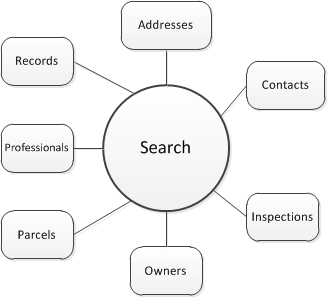Searches
Searches
| Name | App Type | Scope | Auth Type | Resource URI | Civic Platform version |
|---|---|---|---|---|---|
| Search Addresses | All | addresses | No auth required | POST /v4/search/addresses | 7.3.2 |
| Search Agencies | All | agencies | No auth required | POST /v4/search/agencies | 7.3.1 |
| Search All | All | global_search | Access token | GET /v4/search/global | 7.3.2 |
| Search Assessments | Agency | assessments | Access token | POST /v4/search/assessments | 9.0.0 |
| Search Contacts | All | contacts | Access token | POST /v4/search/contacts | 7.3.2 |
| Search Costs | Agency | costs | Access token | POST /v4/search/costs | 7.3.3.2 |
| Search Inspections | All | inspections | Access token | POST /v4/search/inspections | 7.3.2 |
| Search Owners | All | owners | Access token | POST /v4/search/owners | 7.3.2 |
| Search Parcels | All | parcels | No auth required | POST /v4/search/parcels | 7.3.2 |
| Search Parts | Agency | parts | Access token | POST /v4/search/parts | 7.3.3.2 |
| Search Professionals | All | professionals | Access token | POST /v4/search/professionals | 7.3.2 |
| Search Records | All | records | No auth required | POST /v4/search/records | 7.3.2 |
Overview:
Search
The system provides users with a global search feature to locate records and objects in the system database. In the global search, you specify search criteria and you view the records that meet the criteria in a global scope.You can further organize the search results by applying filters to the results set.

Another important use for searches is to ensure valid reference data are used with transaction data. For example, searching for valid address, parcel, and owner objects ensures that data integrity and business rules are enforced when creating records.
Construct search API's use the HTTP POST method to allow an extensive set of search parameters in the request body.
Using Wildcards
A wildcard is a special character (%) you can use in your search criteria to represent one or more characters in a string of characters. When used, it can represent an undefined value. Where you place the wildcard character determines which part of the name or phrase you are not searching for.
Example Use Case
You are searching for an owner with the last name equal or similar to Johnson. You enter %son as the search criterion. The search result includes all names it finds ending in “son,” including Johnson and Thompson. If you enter john%, the search results includes all names beginning with “John,” including Johnson, Johnston, and Johns. If you enter %john% and click search, the results include all names with “john” anywhere within the whole name, including Johnson, or St. Johns.
Advanced Search
If you perform advanced search with multiple fields, the search follows the following general rules:
If you base a search on two or more detail search fields, the system uses AND to locate that contain all the search criteria. For example, if you pick two fields within the record detail search fields, the search applies this rule.
If you base a search on fields across different categories, such as between record search fields and Address, Parcel, Owner (APO) template search fields, Accela Construct uses the AND rule to perform the search. For example, if you pick one record detail search fields and one search field from the APO template, the search applies this rule.
If you base a search on two or more Task Spec Info, App Spec Info, or APO template search fields, Accela Construct uses AND to locate records that contain only one of the search criteria. For example, if you pick two fields within the APO template, the search applies this rule.
If you base a search on two fields from the record detail search and the APO template, Accela Construct uses AND and OR to perform the search.
A search works for the following objects:
addresses
contacts
global
inspections
owners
parcels
professionals
records